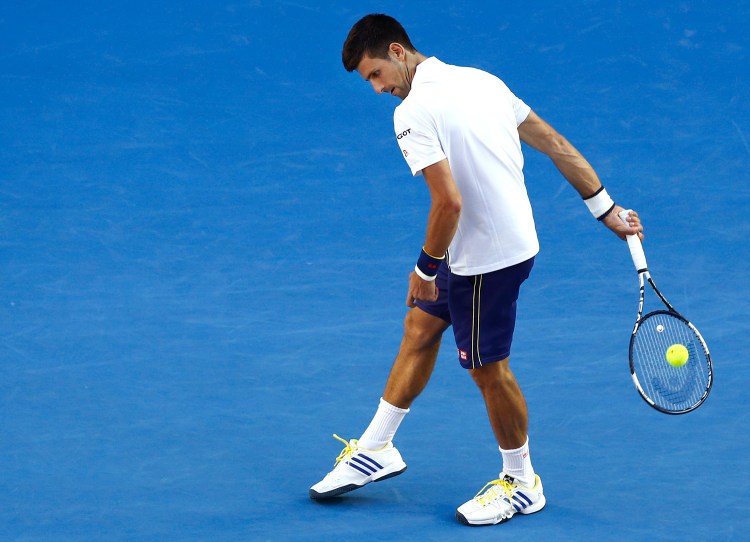MELBOURNE, Australia – Novak Djokovic was looking everywhere for answers, even in the crowd.
The top player in tennis, who won 27 of a possible 28 matches in Grand Slam matches in 2015, had the number 100 in the unforced errors column after his 6-3, 6-7 (1), 6-4, 4-6, 6-3 win over Gilles Simon at the Australian Open.
The win secured his spot in the quarterfinals for the 27th consecutive major, equaling Jimmy Connors at No. 2 in that streak and trailing only Roger Federer’s record of 36.
Yet Djokovic still thought it was a forgettable day. He was dissecting the match in an on-court interview Sunday when a burst of laughter from the crowd caught his attention.
“Sorry, everybody is laughing. I just want to hear, what did you say?” Djokovic said, looking into the stands. The answer came back loud and clear: “No more drop shots.”
“OK, thanks buddy,” Djokovic deadpanned. “I hate to say, but you are absolutely right.”
A handful of ill-advised and poorly executed backhand drop shots by Djokovic made up the most glaring of his unforced errors.
“I don’t think I’ve had any number close to 100,” he said. “In terms of the level that I’ve played, it’s the match to forget for me.”
He hit 62 winners, and won 100 of the 176 rallies of four shots or fewer, but only 48 of the 101 featuring nine shots or more.
“Sometimes you have a brain freeze, if I can call it that,” Djokovic said, explaining how he wasn’t in rhythm and was trying to finish off points quickly. “Again, I won it, so it’s pretty good. When you’re playing that bad and still manage to win – hopefully it’s going to get better next one.”
Simon entered the match with a 1-9 win-loss record against Djokovic, but thought he’d worked out a way to beat the Serbian star by consistently and desperately keeping the rallies alive.
“I know a lot of players wanted me to win this match,” the 31-year-old Frenchman said. “A lot of players will feel better with Novak out of the draw.”
Federer watched Djokovic’s match, before going out to beat No. 15 David Goffin 6-2, 6-1, 6-4 in a match that finished after midnight, and the error toll didn’t bring him any joy.
“He makes you miss. He makes you go for the lines and he runs down a lot of balls. A lot of points end in errors,” Federer said of Simon. “This was five sets. So, of course, there’s going to be a lot of unforced errors piling up. The question is if you have 50, 100, at the end of the day it doesn’t matter as long as you win.”
Djokovic did just that, improving his record to 36 wins in his last 37 matches at Melbourne Park, and will next play No. 7 Kei Nishikori, who beat No. 9 Jo-Wilfried Tsonga 6-4, 6-2, 6-4 with a more conventional style of game.
Federer, a four-time champion in Australia, secured a quarterfinal against No. 6 Tomas Berdych, a 4-6, 6-4, 6-3, 1-6, 6-3 winner over Roberto Bautista Agut.
Djokovic’s struggles increased the drama after a relatively routine start to Day 7, when six-time champion Serena Williams and Maria Sharapova confirmed their quarterfinal date with straight-set wins, ensuring a rematch between last year’s finalists.
No. 4 Agnieszka Radwanksa rallied from 5-2 down in the third set to win 6-7 (6), 6-1, 7-5 against Anna-Lena Friedsam, who finished the last two games hobbling and in tears, and also conceded a point penalty on her last serve, after taking a medical timeout for what appeared to be cramps. Radwanska next plays No. 10 Carla Suarez Navarro, who had a 0-6, 6-3, 6-2 win over Russian-born Australian Daria Gavrilova.
Williams, a 21-time major winner, had a 55-minute, 6-2, 6-1 win over Margarita Gasparyan to set up a big match against Sharapova, a player she has beaten in 18 of their 20 matches.
Fifth-seeded Sharapova had a career-high 21 aces and hit 58 winners in her 7-5, 7-5 win over Belinda Bencic.
Williams won 26 matches in a row at the majors last season, capturing the Australian, French and Wimbledon titles and reaching the semifinals at the U.S. Open before a stunning loss to Roberta Vinci ended her run for the season slam.
That’s the driving factor here.
“For my whole career I have been motivated by losses. So that’s just been my thing,” she said. “So each time I take a loss, I feel like I get better.”
Sharapova won consecutive matches against Williams in 2004, but has lost all 17 meetings since. It’s a statistic she tries to block from her mind.
“I got myself into the quarterfinal of a Grand Slam,” the 2008 Australian Open champion said. “There’s no reason I shouldn’t be looking to improve and to getting my game in a better position than any other previous round. It’s only going to be tougher, especially against Serena.”
Send questions/comments to the editors.



Success. Please wait for the page to reload. If the page does not reload within 5 seconds, please refresh the page.
Enter your email and password to access comments.
Hi, to comment on stories you must . This profile is in addition to your subscription and website login.
Already have a commenting profile? .
Invalid username/password.
Please check your email to confirm and complete your registration.
Only subscribers are eligible to post comments. Please subscribe or login first for digital access. Here’s why.
Use the form below to reset your password. When you've submitted your account email, we will send an email with a reset code.